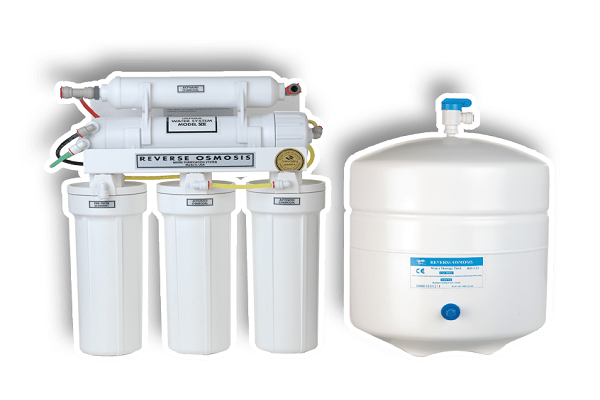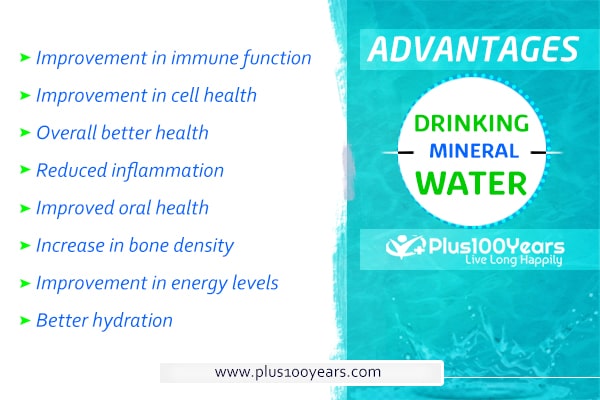Water is the most important source of life on earth. Impure and polluted water has become a serious threat to human sustenance.
Water is the most important source of life on earth. Impure and polluted water has become a serious threat to human sustenance. Several factors contribute to making the water impure such as climatic changes in the form of droughts, floods, rise and fall in the sea levels, dumping of wastage, and overpopulation.
Contaminated water is the major cause of serious diseases in both humans and animals. That is why it is very important to be cautious about the type of water you are drinking.
Nature’s Greatest Treasure-Mineral Water
Contrary to the common belief that the treated bottled water is the best mineral water, the pure form of mineral water oozes out from the depths of the earth. This mineral water carries several minerals that lay embedded within the earth.
Moreover, it is filtered naturally as it goes through countless ups and downs during its underground journey.
- Practically water that contains several minerals including sulfur compounds and salts and is usually obtained from a mineral spring or well is called mineral water.
- This water has a sparkling sheen (effervescent) due to the presence of different gases.
- Mineral water has been used traditionally to cure several skin ailments.

Mineral Water Classification
Natural mineral water has different origins and depending upon its source, the presence of mineral percentage also varies. The classification is as follows:
- The water that sees daylight when it surfaces is known as juvenile mineral water.
- The water produced by snow, rain, and de-icing is known as meteorological mineral water.
- The water produced from the sea floor’s sediment deposits is known as fossil mineral water.
- The water composed of fossil water, meteoric, and juvenile or youth water is mixed mineral water.
Since traveling to different destinations for getting mineral water is not feasible, different brands have introduced mineral water in the bottle and at present, almost 3000 brands supply mineral water commercially all over the world.
Mineralized and Mineral Water-The Difference
- Mineralized water is water that is obtained from a source of drinking water and replenished with added minerals.
- This means that mineralized water has artificial mineral properties.
- On the other hand, mineral water is the naturally obtained water without any human intervention.
Which Type of Water Do Humans Need?
The human body needs minerals to carry out different functions however these micronutrients are mostly overlooked in the daily diet. Decades back the soil was enriched with minerals such as zinc, calcium, magnesium, etc., and these micronutrients reached our body through fruits and vegetables.
However, the diet of the present generation mostly includes processed and packaged food that is deficient in minerals. This deficiency can be easily covered by drinking naturally occurring mineral water which is pure and provides minerals in its most natural form.
Note: Humans should drink well water, natural spring water that is unprocessed but purified or filtered and includes a minimum of 250/ million different types of dissolved solids such as trace elements and minerals.
How Do Minerals in Drinking Water Affect Your Health?
Most often people drink bottled mineral water because regular foods in the diet do not supply enough of these micronutrients. However, you do not need to use artificially processed bottled mineral water because the regular tap water provided for drinking contains an adequate amount of minerals.
- If you drink around two liters of water in a day, your body receives a supply of 15 percent of its daily requirement of calcium, one-third of magnesium, and more.
- Although the amount of minerals in the water depends upon the source of water, mostly the drinking water that is supplied through the tap contains enough minerals to suffice your requirements.
- Only in case, you are deficient in minerals, you can switch over to bottled mineral water for a short time as the branded mineral water contains almost four times more quantities of magnesium and calcium.
- People suffering from blood pressure and having a magnesium deficiency can lower their blood pressure by drinking one liter of bottled mineral water every day.
- Regular water contains magnesium and calcium which are essential for the strength and development of the bones.
- People having hard water or soft water supply should use adequate softening or hardening systems to make the water drinkable so that the water does not affect their health.
{ Also Read: What Happens If You Drink Less Water }
Advantages of Drinking Mineral Water
Briefly, drinking mineral water leads to:
- Improvement in immune function
- Improvement in cell health
- Overall better health
- Reduced inflammation
- Improved oral health
- Increase in bone density
- Improvement in energy levels
- Better hydration
Is Bottled Water Safe?
It is a common misconception that since the water comes in a clean and transparent bottle without any suspended impurities, it is completely safe and pure. However, this is not true.
- Bottled water can contain the dangerous toxins that leach out of the plastic used for bottling.
- More often, artificial flavors are added to make the water sweet and lack the natural balance of essential minerals required by the human body.
- To add more flavors, some brands of mineral water have a high content of minerals that are not healthy for a normal person.
- While some of the brands provide naturally carbonated mineral water, several brands add carbonation to the water.
- Due to the varying mineral profile, each bottled mineral water has a different taste and the nutritional benefits are not always as required by a normal human body.
- For example, a particular French Vichy brand has high sodium content, which is almost twice the amount of sodium present in the naturally occurring mineral water.
- Another French brand, Perrier is very low in sodium but is deficient in magnesium.
Hence, it is never safe to consume bottled mineral water regularly unless advised to increase the intake of a particular mineral.
Why is Filtering Water Necessary?
- Due to the deposit of waste and pollution, the naturally occurring mineral water nowadays can carry several water contaminants such as lead, nitrates, arsenic, cryptosporidium, giardia, radium, and pesticides.
- Similarly, other forms of the disease-causing content such as viruses, nasty parasites known as protozoans, and bacteria are also present in the water.
- These are not visible to naked eyes.
- Therefore, it is very important to remove these contaminants, or else they can lead to harmful diseases.
- Instead of using artificial water purification treatments such as ion exchange, complex and chemical filtration, and distillation, it is better that you opt for filtering the water naturally.
Does Boiling Make the Water Fit for Drinking?
Here are some facts that will surely open your eyes:
- When a leading microbiologist, Professor Brett Neilan, compared boiled and non-boiled water, he found out that one drop of non-boiled water had many bacteria.
- In the case of boiled water, he could see the presence of dead cells that looked like debris within the water.
- Nevertheless, if you think that this makes the boiled water safer, then you are surely in for a big surprise.
The biggest outbreak of blue-green algae in the 1000 km area of Darling and Barwon rivers in November 1991 has revealed that these algae are a type of toxins that contain at least 200 times more toxins than the dangerous cyanide.
- Actually, when the water was boiled, Michael observed that the bugs were removed but the toxins released by the bugs remained in the water.
So, is boiled water safe? Although boiling kills the harmful bugs and parasites present in the water, it cannot neutralize or remove the presence of toxins released by these bugs. So, if you are drinking mineral water from a natural source you should first filter the water and then boil it. Only then, the water can be considered safe for drinking.
Filtering Water Naturally
There are a host of different ways of filtering the mineral water naturally without removing the traces of minerals present in it.
Sedimentation
- Naturally, natural sediments filter the water by the force of gravity.
- This ensures that the heavier and suspended materials within the water settle down and the lighter sedimentation float to the top.
- This process involves flocculation and is carried out by using iron salts or alum or even synthetic polymers.
- They attract and bond with the suspended materials and form floc.
- In this way, the suspended impurities in the water are separated from the rest of the water.
- The water is left stagnant for a while during which the sedimentation process takes place and all the impurities settle down.
- It is a low-cost process, can be easily carried out at home, and provides pure mineral water.
Treating Water with Ultraviolet Light
- Ultraviolet light acts as a natural biological water filter.
- When the water is exposed to artificial ultraviolet rays, you get clear, filtered, and purified water.
- Ultraviolet rays effectively destroy cryptosporidium, a microscopic parasite from the water that has been known to cause intestinal infections in humans and animals.
Other natural processes of filtering include sand filtration and oxidation aeration. Although these are natural processes of filtration they have to be carried out using a specialized technique that requires knowledge of handling dedicated equipment. These filtration processes are more suitable when a large amount of water is to be filtered.
What is Reverse Osmosis?
As of today, reverse osmosis is considered the best way to get a pure glass of mineral water. It is also an effective desalination treatment (removal of salt from the seawater), and wastewater treatment, used for recycling, and also for producing energy. The process is also used to remove water from ethanol.

How Is It Carried Out?
- Reverse osmosis a process is based on diffusion.
- During diffusion, molecules move from one region having a higher concentration to another region with a lower concentration.
- Osmosis is considered a special kind of diffusion process during which the water molecules move across the semipermeable membrane along with the concentration gradient.
During osmosis, the semipermeable membrane ensures that the water is allowed the passage from one region to the other while particular ions of Na+, Ca 2+ or Cl– and bigger molecules of bacteria, urea and glucose are restricted from passing.
- This process continues until equilibrium is reached as osmosis and diffusion favor thermodynamics.
- During osmosis, the speed of the process can be reversed, slowed or even stopped for a while to ensure that proper pressure is being applied to the membrane.
- Reverse osmosis takes place when the water molecules move against the regular concentration gradient- from the lower region of concentration to the higher region of concentration.
RO provides one of the purest and healthiest forms of mineral water. You can use specialized RO filters for getting pure and safe drinking water and protecting your family from harmful waterborne diseases.
“We would greatly appreciate it if you kindly give some feedback on this article”


